UNIVERSITY HONORS COLLEGE
MIDDLE TENNESSEE STATE UNIVERSITY | FALL 2024

FOLLOWING THE BREEZE
Incarceration altered his life; now Buchanan Transfer Fellow Brian Maxwell helps reform local inmates

MIDDLE TENNESSEE STATE UNIVERSITY | FALL 2024

Incarceration altered his life; now Buchanan Transfer Fellow Brian Maxwell helps reform local inmates

ARETÉ MAGAZINE is a publication of the MTSU University Honors College, distributed free to faculty, staff, alumni, and friends.
Special thanks to Paul Martin Jr. for supporting this publication.
DEAN
John R. Vile
EDITOR
Robin E. Lee
SENIOR UNIVERSITY EDITOR
Drew Ruble
ASSOCIATE EDITOR
Carol Stuart
CONTRIBUTING EDITOR
Nancy Broden
DESIGNER
Brittany Blair Stokes
UNIVERSITY PHOTOGRAPHERS
Andy Heidt, J. Intintoli, James Cessna, Cat Curtis Murphy
INTERIM ART DIRECTOR
Kristy D. O'Neal
UNIVERSITY PRESIDENT
Sidney A. McPhee
UNIVERSITY PROVOST
Mark Byrnes
VICE PRESIDENT OF MARKETING AND COMMUNICATIONS
Andrew Oppmann
CONTRIBUTORS
Skip Anderson, Jael Guest, Laura Clippard
COVER PHOTO
Andy Heidt
1,660 copies, printed at Starkey Printing, Chattanooga, Tennessee
Designed by Creative and Visual Services
0724-04B / Middle Tennessee State University does not discriminate against students, employees, or applicants for admission or employment on the basis of race, color, religion, creed, national origin, sex, sexual orientation, gender identity/expression, disability, age, status as a protected veteran, genetic information, or any other legally protected class with respect to all programs and activities sponsored by MTSU. Inquiries about Title IX can be directed to the Title IX Coordinator and/or the U.S. Department of Education’s Office for Civil Rights. The Title IX Coordinator can be reached at Cope Administration Building 116, 1301 East Main Street, Murfreesboro, TN 37132; Christy.Sigler@mtsu.edu or 615898-2185. The MTSU policy on non-discrimination can be found at mtsu.edu/iec.
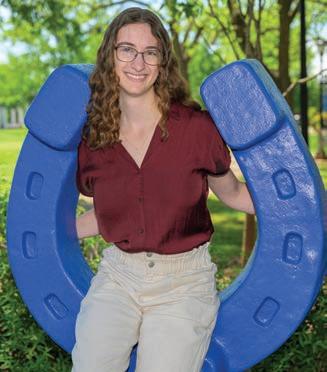
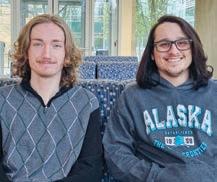
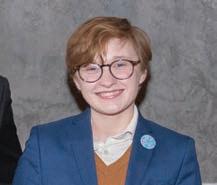

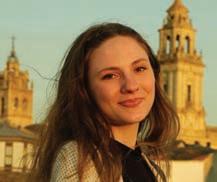

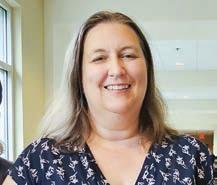

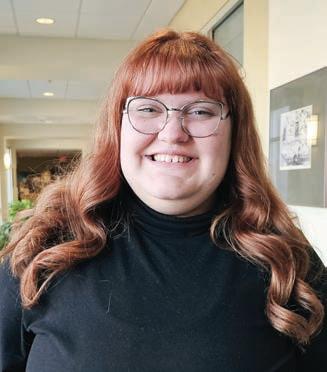


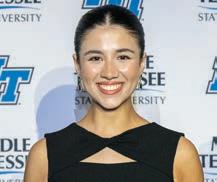
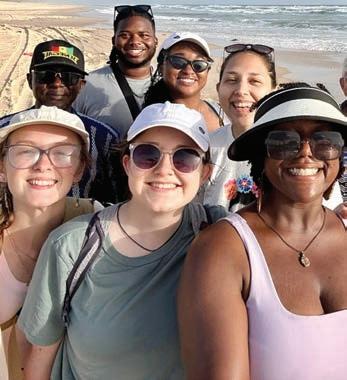
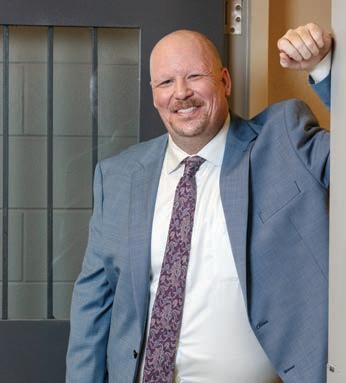
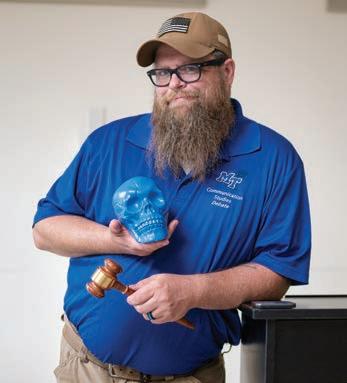

After celebrating 50 years of Honors at MTSU, “the beat goes on,” the college continues to serve, and our students continue to soar.
This year, all four of MTSU’s most prestigious awards went to Honors students. Ross Sibley, a Biochemistry major, won the President’s Award; Sydney Robbins, a Forensic Science major, earned the Provost’s Award; Sarah Kamaridinova, a Biology/Pre-Dental student, received the Robert C. LaLance Jr. Award; and Brian Maxwell, a Video and Film Production major, won the Community Service Award. Maxwell and Elliot Certain, a Social Work student, also won the statewide Harold Love Community Service Award.
Our students continue to soar.
Brittany Johnson, a Global Studies and Spanish graduate who has been serving as a Fulbright Scholar in Spain for the last two years, became the first MTSU student and one of only 25 U.S. and 90 worldwide applicants to be named a Gates Cambridge Scholar and will pursue her graduate study in Great Britain.
Ariel Nicastro, a Physics major who studied at Oak Ridge over the summer, was named a Goldwater Scholar, and Rachel Booher, an English and Japanese major, became the first student to win a $20,000 Marcus L. Urann Fellowship from the Phi Kappa Phi Honor Society. The MTSU chapter further awarded its first scholarship of $1,000 to Maxwell to continue his graduate education in MTSU’s College of Media and Entertainment, and Ethan Estes received a PKP study abroad scholarship.
Victoria Grigsby recently participated in a program studying the Mississippi Delta and studied over the summer in Germany as a Gilman Scholar. Other MTSU students who received Gilman Scholarships to study abroad over the summer include Solyana Asefa, Mairiam Ibrahim, Jessica Stites, and Grace Young-ah Sandidge. Jake Salter spent the summer as a Fulbright intern in Canada.
Several students in the sciences participated in Research Experiences for Undergraduates (REUs) at other universities across the country over the summer. They include Carlos Aldana Lira, Elijah Adkins, Lula Baldriche, Thomas Freeman, Isabel Jacober, Brian Matthews, Skye Neal, and Dara Zwemer. Recent MTSU graduates Jayme Frazee, Brionna Harbach, William Birdwell, and Coby Taylor are joining those who are already teaching in Japan as part of the JET Program. Rebecca Clippard, a previous JET recipient, has been awarded a MEXT Research Scholarship to pursue a graduate degree in Japan. Rachelle Laurel received the Bridging Scholarship for Japan to teach overseas.
Many other recent graduates are headed directly to graduate and professional schools. Samuel Apigian was awarded a DAAD RISE fellowship to study in Germany over the summer, and Laura Clippard, who heads our Undergraduate Fellowship Office, recently participated in a trip to Germany sponsored by the DAAD scholarship program.
We regularly post stories about our students that are increasingly being picked up by local media. Both because of our success with these media, and rising print costs, we will be issuing Areté only once a year. We hope that you are also following the two online issues of our literary magazine, Collage, that we post each year. Copies of our amply illustrated book, Celebrating 50 Years of the Honors College, remain on sale for $35 in the MTSU bookstore.
Please keep in touch as we begin our next 50 years!

Follow us on social!

John R. Vile Dean, Honors College
noun (ahr-i-tey) the aggregate of qualities, as valor and virtue, making up good character


When he was a 17-year-old high school student, Elijah Blank learned that he had acute lymphoblastic leukemia (ALL). After receiving that diagnosis Dec. 23, 2021, he missed attending several months of his junior year in person while receiving homebound care.
“It was weird going back to class,” he recalled. “I felt like a dead man walking because I was bald, and my face was rounder from the steroids.”
While Blank was glad to finally know the cause of the fatigue, fever, night sweats, and other symptoms that had come on suddenly and lasted for more than a month, he admits it was difficult to come to terms with initially.
“I had always been so socially involved, and now, I stared down the barrel of seemingly ceaseless treatment, where my only human interaction would arrive every six hours, neatly packaged in momentary awkward small talk as my vitals were monitored,” he said. “When I started going back to class, people seemed afraid to ask personal questions, and they even told me they were scared I was going to die.”
Ever resilient, Blank says an unexpected hope emerged when he started receiving interim maintenance chemotherapy, a new stage of his ALL treatment.
“I regained some of my strength, which went a long way for me both mentally and physically,” he said. He was able to complete nine Advanced Placement and dual credit courses during his senior year.
Blank continued his chemo as a college freshman last year, finishing his last monthly treatment on April 14. Now a sophomore Honors student at MTSU, with a double major in Biochemistry and Physics, he plans to pursue M.D. and Ph.D. degrees and become a physician.
LIFELONG FRIENDSHIP
Blank’s fortitude shines through as he recollects what it was like to lose contact with people while going through the process, and he cherishes those he remains in contact with. “I remind myself of the fear that I used to feel and how far beyond that I have grown. And, with the right support, nothing will ever come close to holding me back again.”
One such relationship is with his friend Matthew Feragola, his freshman roommate at MTSU. They have known each other since sixth grade.
“At first, we got on each other’s nerves. The first thing I noticed was that he was academically gifted, like me, just in different areas,” said Feragola, who
By Robin E. Lee
described Blank as a “terrible genius” in math and science. “He would seek out information and learning on his own and often teach things to himself before he took the class.”
When I started going back to class, people seemed afraid to ask personal questions, and they even told me they were scared I was going to die.”
The pair stuck together on field trips and bonded over music. While Feragola admits they butted heads a lot in middle school, by the first year of high school they had become inseparable, spending every weekend at each other’s houses.
“I found out about his illness when I was driving home from school one day. I was at the intersection of Old Fort and Broad when he called and said the doctors believed he had a weird form of anemia, but Elijah thought he had leukemia,” Feragola said. “The doctors did more research, and he got the results immediately before Christmas.”
Blank decided to shave his head the day after Christmas and say goodbye to his friends because he would be starting treatment in the new year.
“My family had plans to visit my great grandmother over that time,” Feragola said, “and I was really sad that I wasn’t going to be able to see Elijah and say goodbye. We got to her house and learned that she had the flu, so we didn’t even get to visit with her; we just came back. The whole trip was for nothing, and I didn’t get to see him either.
“I knew that what he had was survivable, but I felt like I was going to lose him one way or another. I felt like he wasn’t going to be the same when he came back.”
When he was first diagnosed, Blank made the choice to shave his head. “Every stage of hair loss is different,” he said. “But now that it grows, I don’t want to cut it.”
Beyond hair, Blank’s journey has come with several other causes of frustration.

“I detest the idea that this thing I hate about myself has become my opening line in every introduction, but how can I keep my mouth shut on an issue so personal to me?” Blank questioned.
Many people cannot imagine what it is like to agonize through cancer treatment, let alone while also dealing with the fallout of the COVID-19 pandemic. Given the immunosuppressant nature of ALL and Blank’s treatment, he was rightly concerned about returning to class and completing his junior and senior years among his peers.
The initial three months of treatment began with two weeks in the hospital, then not being able to visit with anyone when he first arrived home. Later, Blank would endure full days of chemo followed by 48 hours of saline and being monitored.
“He would come home and be so fatigued, constant no energy, and he was still trying to keep up with schoolwork from home,” said Feragola, who himself suffers from Hashimoto’s disease, a life-threatening condition, as well as autism and obsessive-compulsive disorder. “We watch out for each other and ensure we take care of ourselves and each other.”
Blank did keep up. By March, he was back at school, having driven himself a half hour to get there. The academic achiever set his sights on attending MTSU after graduation.
In April 2023, Feragola received a scary 3 a.m. wakeup call from Blank and had to rush him to the hospital.
“When I answered the phone, he was wheezing and saying he couldn’t breathe. His parents both leave for work early, and they were already gone at the time,” Feragola recounted. “I lived about five minutes away.”
At Vanderbilt, Blank was diagnosed with parainfluenza, which normally causes minor respiratory symptoms but can kill someone who is immunocompromised. He spent the night in the hospital.
“That was a moment when we realized that being roommates would be a good idea,” Feragola said.
Blank has been able to turn his experience into something positive, focusing his high school thesis at Rutherford County’s Central Magnet School on pediatric cancer and his own firsthand experiences. He presented this thesis last spring at the Tennessee Collegiate Honors Council conference.
“I conducted surveys of pediatric cancer knowledge and found that many underestimated the survival rate. Education is important; the lack of education causes fear and makes it difficult to maintain relationships,” Blank said.
Delving into the world of cancer advocacy, Blank researched the profound impact of misinformation on patients and their families. “My research in high
school quickly evolved into a greater mission to combat misinformation in the broader community.”
Blank planned to take 18 credit hours his first semester at MTSU, but Feragola convinced him to drop one of the classes and ease into college life. He took 18 hours in the spring, though.
“He has always been extremely ambitious, always trying to challenge himself. He tried to triple major, but the Pell Grant would not cover it, so he is humbly sticking with a double major of Biochemistry and Physics, with straight As,” Feragola joked.
Biology Department Chair Dennis Mullen, who has taught Blank in two Honors Biology courses, said he asked for no special accommodations as allowed— and didn’t fall behind while missing a class or two for doctor appointments. “Elijah is a very bright young man. He enjoys learning and being challenged,” Mullen said.
His friend admits Blank was always a little loopy on the days he received his treatments. “It’s a testament to how strong he is, how far he’s come, and how far he’ll go,” Feragola said.
“Two years is so long. It sounds like nothing at first; now we are here. I can’t imagine if his life had been cut short, how different everything would have been,” he said.
“Now, his hair has grown back in wonderful curls, and he is still eager to learn. A few nights ago, when I returned home from work, he was working in a textbook that he got for himself, and he was excited because he finally got to something he didn’t already know.”
Blank said he chose MTSU because of the state-of-theart Science Building, scholarship opportunities, and its proximity to Vanderbilt Pediatric Oncology, which he called “one of the best in the nation.”
Before, I wanted to go to pharmacy school; now, that’s not enough.
“General knowledge of, and treatment for, pediatric cancer has improved drastically,” he said.
There are more than 100 kinds of cancer. The five-year relative survival rate for leukemia has improved from only 34% in 1975 to about 84% currently, according to the Leukemia and Lymphoma Society and the Vanderbilt Children’s Hospital Health Library. Currently active at MTSU in the Biology and Chemistry clubs, and as a calculus tutor, Blank said he was always interested in the medical field, even before his diagnosis.

The devoted friends now share honest feedback with each other. Feragola wrote something to Blank that made him tear up. “He didn’t see what he was going through as traumatizing; he just thought about it as a thing that happens. When he understood the impact of what he was going through and what he had been blocking out, it was a little bit of turning point for him and helped him come to terms with what he was experiencing.”
This level of compassion and understanding inspired Blank’s high school thesis.
“During the initial stages of his recovery, people he was once close to disappeared,” Feragola said. “Some may have felt too emotional about what was going on. While others did the opposite, and it felt like they were making his illness about themselves. People can act strangely about illness and death.”
“Before, I wanted to go to pharmacy school; now, that’s not enough,” said Blank, who is considering specializing in neurology, neurosurgery, or psychiatry. He is interested in studying psychiatric treatments and looking beyond traditional methods of treatment to help people.
His summer involved plans to work at a rehab center and help serve an unfortunately stigmatized population. “I have a friend who has gone through rehab for drug use, and I have been around people who went through Narcotics Anonymous.”
Following his final chemotherapy appointment, he celebrated by planning a trip with friends to Mexico.
“My life expectancy has decreased by six to 11 years, but I am as close to being cured as you can be,” Blank said.
“As I recovered, my mother and I began to hike regularly, an excursion we still maintain. As I continue to recover, I would like to run more. But most of all, I can’t wait to become a doctor and discover techniques to help others.”
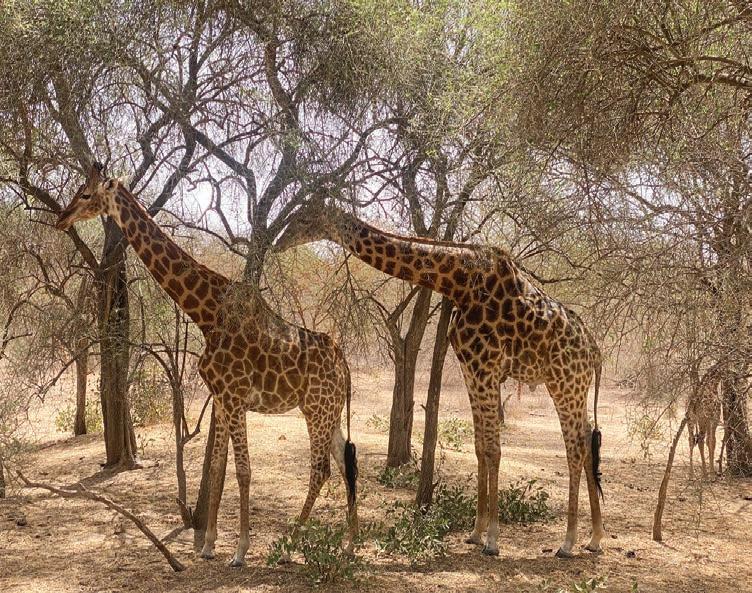
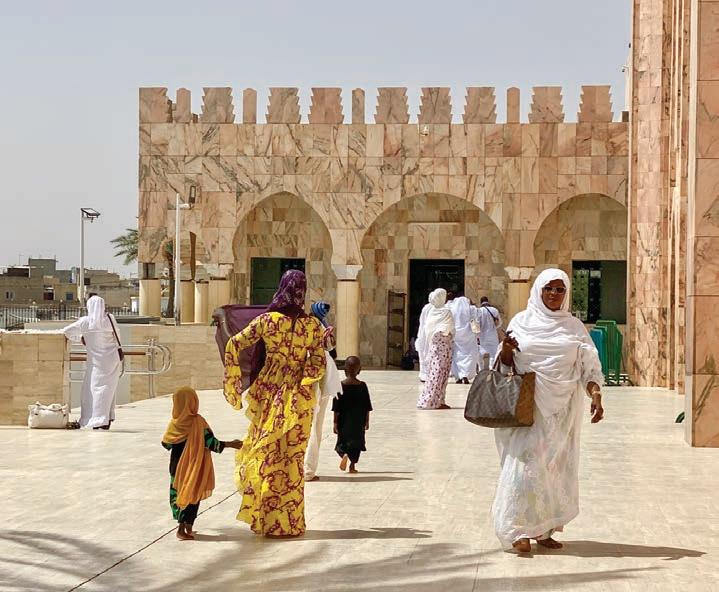



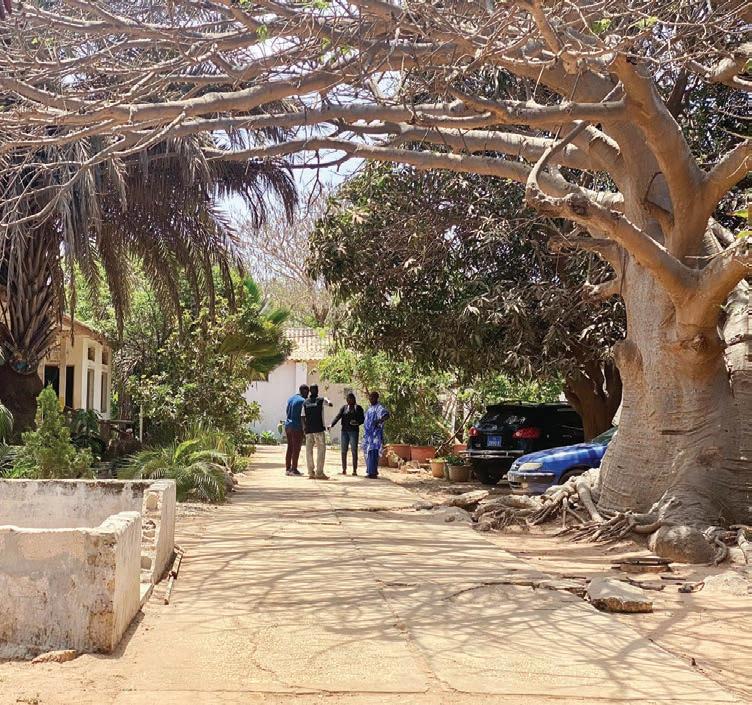



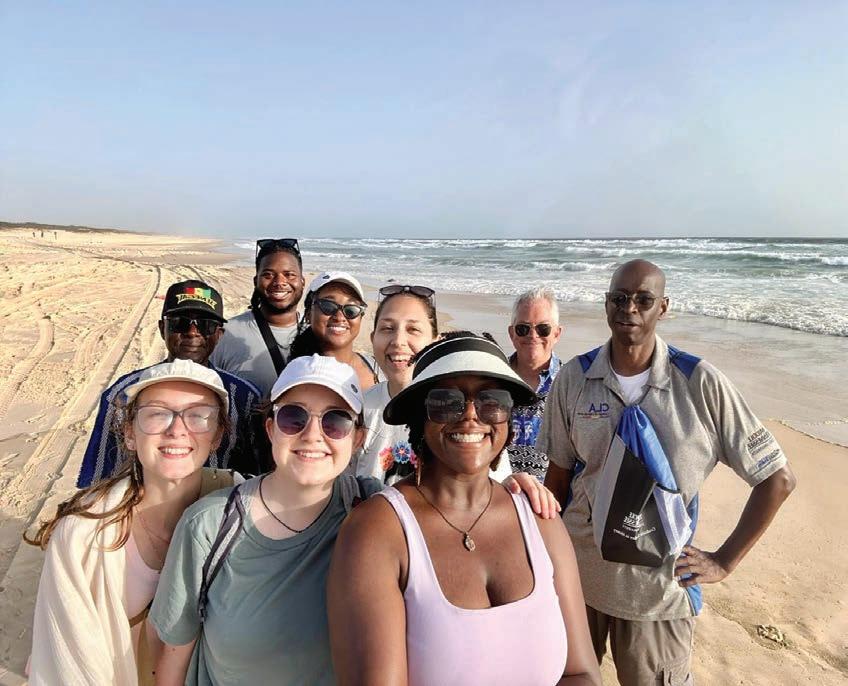
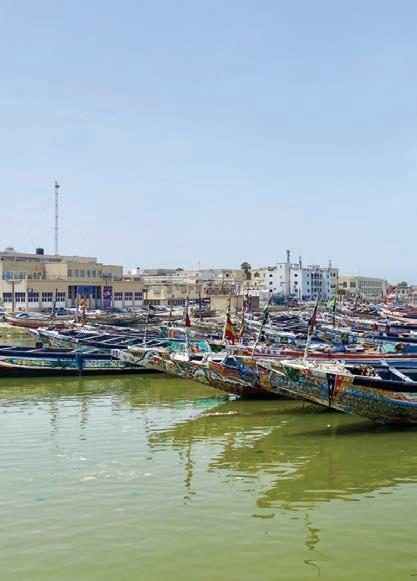

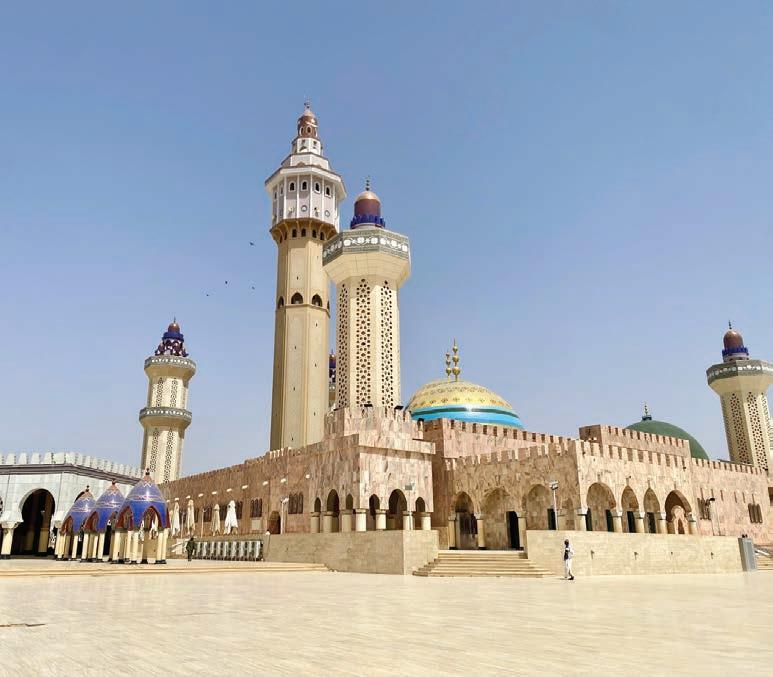
By Jael Guest, Honors Ambassador and Foreign Languages major


Fighting the crisp sea wind, I brush away my bangs and shield my eyes to gaze over the city of Dakar. Soaring 171 feet above me, a proud family wrought in bronze lifts their eyes to the horizon, to a future of liberty and prosperity for the continent. As I stand in the shadow of the Monument de la Renaissance Africaine, the tallest statue in Africa, I feel a thrill of excitement: I am realizing my dream of experiencing this beautiful country after nearly a decade. Since high school, international travel was less of a wish and more of a goal set in stone for my undergraduate years. I have specifically wanted to visit West Africa since I started taking French eight years ago. The first day of class, we looked at a map of la Francophonie, “the Frenchspeaking world.” How vast it was beyond the little country that birthed the language! And what a tragic, complex, and relevant history behind the language’s widespread influence.
A

In terms of academic study, I was immediately drawn to the linguistic and cultural intermingling of French and local languages in former French colonies. I also added Arabic as my second language of study since a significant portion of French-speaking Africa is Muslim. Senegal is not just a former French colony but also was the center of French activity in the region throughout the slave trade and colonization.
After spending a life-changing year in Caen, France, through an MTSU exchange program, I returned to the States last June restless and ready to travel again as soon as possible. The History in Senegal program had been ruminating in the back of my mind since I learned about it at the annual study abroad fair my freshman year. What could be a more perfect follow-up to a year in France than a trip to the former capital of l’Afrique
Occidentale Française?
Led by MTSU History Professor Aliou Ly and his childhood friend (and professional tour guide) Chérif, the trip was history-on-location at its finest. Both native to Dakar, Dr. Ly and “Uncle” Chérif guaranteed a safe, smooth trip and were able to give us invaluable insight wherever we went. We spent 18 days staying in hotels across several significant cities, including Dakar, Saint-Louis, Touba, and Saly. First, we spent several days in the capital Dakar, soaking in our first impressions of the culture and people of this bustling coastal city. One of the first things I noticed was the color. In contrast to the flat, dusty landscape, the people of Senegal imbue their daily lives with vibrancy: from the vehicles—colorful public buses, elaborately painted fishing boats, cheerful patterns added to horse-drawn carts—to the buildings—inspiring murals and quotes from African leaders found

in even the most humble of locations—and, of course, the people themselves—most women, no matter their economic status, dressed in splendid colorful patterned dresses that flowed to their ankles, along with matching headscarves and brilliant jewelry. The men could easily match the women in elegance and color with their traditional garb: long pants with a matching knee-length tunic, usually embroidered around the neckline, and sometimes with a small cap to top off the look.
I am realizing my dream of experiencing this beautiful country after nearly a decade.
Every day, breakfast began with fresh local juice and a rigorous discussion on some cultural or political details of Senegalese society with Dr. Ly. At every location, Dr. Ly and our guide, Cherif, would give us a wealth of historical and cultural information while leaving time for questions. Not only at monuments and museums, but every bus ride, meal, or errand was ripe with conversation. We also learned from other locals. For example, we had a lengthy discussion about community values and women’s roles in Senegalese culture with two of Dr. Ly’s nieces-in-law when we visited his home in Dakar. Another day, we spent the morning with the English club at Cheikh Anta Diop University. The students told us about their studying and living conditions, their experience with the education system in Senegal, and their ambitions and dreams. We asked them many questions, but more importantly we became friends.
Some days were full of fun and excitement. We witnessed the vibrant culture at the Village des Arts, the deep sense of community at the naming ceremony of Dr. Ly’s grand nephew, the wonder at African wildlife at the Reserve de Bandia, and the joyful freedom of Senegalese music and dance around a campfire in the desert.
Some days weighed heavily on all of us. From Dakar, we took a boat to Gorée Island, a preserved remnant of the transatlantic slave trade. We walked through a slave house where enslaved Africans were once held in abhorrent conditions before being shipped to the Americas. Similarly, our days in Saint-Louis, the oldest French-built city on the continent (1673), included many discussions of the destruction wrought by colonization on the region. Other topics we studied included widespread corruption in the economic and administrative systems today, neo-colonialism, lack of government-funded infrastructure, economic challenges
due to polygamy and high birth rates among the poor, and obstacles for students seeking opportunity in a strained education system.
Some days were simply about observation. Religion plays an essential role in Senegalese society, but nothing like the highly polarized, politicized culture war in the U.S. Senegalese religion is fundamentally local and divorced from politics. It is hard for Americans to fathom a cultural attitude toward religion that could prompt the 94% Muslim population to elect a Catholic man as their first president after gaining independence in 1960. We stopped in the religious city of Touba to deepen our appreciation for Senegalese Sufi Islam, its influence on cultural values such as hard work, faith, and communitymindedness, and its role in fighting colonization.
A few days later, we explored the extraordinary religious cohabitation in Senegal by visiting the island of Joal-Fadiouth, a primarily Catholic community that maintains a mixed cemetery: Catholics, Muslims, and traditional African religious believers buried side by side.
The culinary experience is one of the best aspects of studying abroad. No one on our trip will eat mango in the States ever again because nothing can compare to the heavenly mango grown fresh and sold on the side of every road in Senegal. “Uncle” Cherif and Dr. Ly were proud when all of the students successfully ate a meal with their hands around one giant bowl, the Senegalese way. This practice also teaches cultural truths such as sharing, contentment, and trust in the elders.
The trip flung me way outside my comfort zone and left me stronger, bolder, and more capable. The values I observed and the lifestyle I encountered have changed the way I live and think on a daily basis. I believe everyone—student or faculty, regardless of major— should take up the once-in-a-lifetime opportunity offered by this program. Senegal is waiting for you!
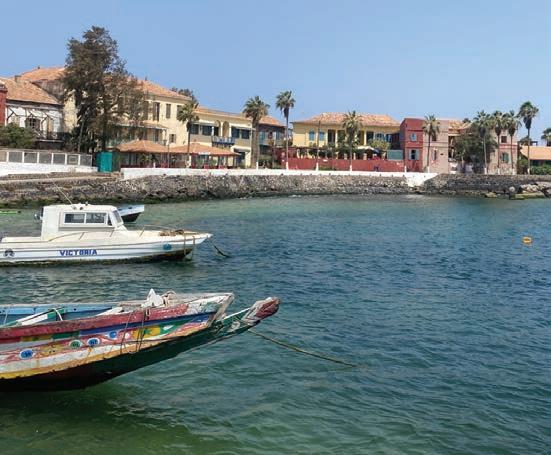
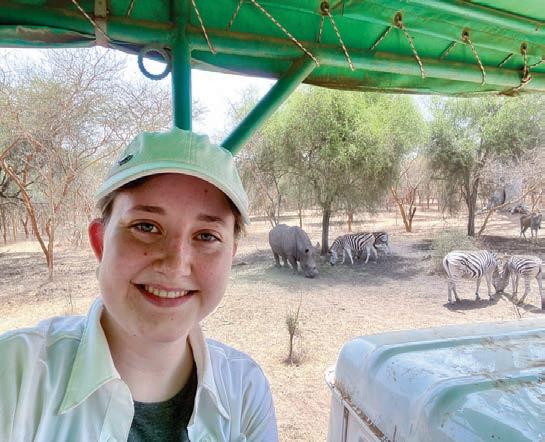



By Josh Narrell
Agribusiness major Anna Collins explored factors that impact farmers selling their land in the Midstate, such as internet access, burnout, and a lack of support, as Tennessee loses 50,000 acres of agricultural land annually.
Nathaniel Harrison, who is studying Accounting, researched the pressing issue of urban heat islands in the region, proposing various roof types as a possible solution to the increased temperatures that urban areas experience.
Data Science student Elijah Mitchell conducted research exploring the relationship between a county’s health ratings and the percentage of income spent on health care. His analysis found a significant divide between rural and urban areas in middle Tennessee, with rural areas bearing a significantly higher cost burden.
All three Honors students were part of the MTSU Chair of Excellence in Urban and Regional Planning (COE-URP) Scholars Program, a pilot initiative that spanned the entire last academic year. The eight undergraduate students in the inaugural cohort embarked on a novel journey to identify and research an urban planning challenge related to middle Tennessee’s explosive growth.
Collins said the program’s feature of taking students “through the research process slowly has been really helpful when I don’t have that opportunity with other projects.” She also noted that the initiative’s focus on regional challenges had taught her more about her
community through her own research and through the collaboration with other cohort members.
“The students have excelled past my expectations,” said Murat Arik, holder of the chair and assistant professor of Management. “They provided substantive analyses of some very complex issues, and their insights offer valuable perspectives on addressing them.”
Each student was paired with a faculty mentor, provided with in-depth training on the research process, and given the opportunity to hear from experts on topics such as housing, sustainability, livability, mobility, economic development, and growth.
The inaugural cohort’s research, presented May 3, also explored the multifaceted need for community gardens using geographic information systems; the connection between a city’s mental health ratings and walkability score; possible solutions to the region’s traffic congestion; the available and needed skills in the region’s workforce; and the impact of Opportunity Zones on developmental inequality in middle Tennessee.
Honors alumnus Paul Martin Jr., chair of the COE-URP Advisory Committee, praised the program, saying the initiative “begins the rigorous journey to address our most pressing social issues through informed urban planning.”
LEARN MORE urp.mtsu.edu/scholarsprogram






Janna Abou-Rahma
Biochemistry
“Mechanism of Action of Antifungal Peptoids”
Kevin Bicker, thesis director


Emily Bigler
Political Science/Spanish
“Tennessee’s Shortcomings in Teaching Our Children to Protect Themselves and Their Peers Against Sex Trafficking”
John Maynor, thesis director
Andrew Bonner
Professional Pilot
“Pilot Training Videos Enhance Student Pilot Training: A Diamond DA-40 Student Pilot Flight
Maneuvers Interactive Video Series”
Wendy Beckman, thesis director
Halle Brandt
Psychology
“Assessing the Predictive Validity of the Short Form Vaping Consequences Questionnaire: Positive Reinforcement Subscale”
James Tate, thesis director
Catherine Bright
Dance
“The Shower Piece, A Study of Differing Perceptions: An Integration of Dance Movement from Stage to Screen”
Jade Treadwell, thesis director
Terri Bush
Commercial Songwriting
“Sing With Me: An Analysis and Live Performance of Songs that Facilitate Audience Participation”
Bess Rogers, thesis director





Emilie Conners
Marketing
“The Body Positivity Movement: Bettering College Women’s Body Image and Health”
Lucy Matthews, thesis director
Katherine Craven
International Relations
“Leda’s Lament: A Musical Adaptation of Sexual Assault
Themes with Greek Mythological Origin Arranged for Flute Choir”
Deanna Little, thesis director
Helen Daniel
Video and Film Production
(Live Production)
“The Production Process: A Behindthe-Scenes Look into the Live Video Production Industry”
Robert Gordon, thesis director
Jillian DeGrie
Studio Art
“Breaking the Stigma around Autism: an Interactive Art Exhibition”
Sisavanh Houghton, thesis director
Samuel Dolinger
Mathematics
“Student understanding of the limit definition of a derivative”
Jeremy Strayer, thesis director
Carter Elliott
Commercial Songwriting
“That’s Why I’m Here: James Taylor’s Lyrical Innovations”
Trevor de Clercq, thesis director
Marissa Farabee
History
“Fractured Images: A Collection of Poetry Exploring Neurodivergent Women and Intimate
Partner Violence”
Bryanna Licciardi, thesis director







Matthew Ferguson
Video and Film Production
“Captivated: A Glimpse at the Hero’s Journey”
Leland Gregory, thesis director

Sydney Fischer
Political Science
“Statistical Analysis of the Relationship Between Literacy Programs and Third-Grade ELA State Assessment Scores in Tennessee”
Steven Sprick Schuster, thesis director
Aaron Gatewood
Biology
“Exploring Scavenging Behavior of Bobcats, Lynx rufus, in Middle Tennessee and its Forensic Implications”
Yangseung Jeong, thesis director
Alexander Hamilton
Organizational Communication
“Investigating How New College Students Make Sense of Their Communication with Individuals from Different Co-cultural Groups and How These Experiences Shape Their Identity”
Elizabeth Dalton, thesis director
Priscilla Hammermeister
Management
“Financial Success Based on Maslow’s Hierarchy of Needs: Survey-Based Evidence”
Tom Brinthaupt, thesis director
Gina Ibrahim
Political Science
“He Said, She Said: Søren Kierkegaard and Simone De Beauvoir’s Divergence on Existentialism and Feminism’s Role in Abortion”
Robb McDaniel, thesis director
Matthew Johnson
Biochemistry
“Synthesis and Characterization of Antifungal Peptoid Dendrimers”
Kevin Bicker, thesis director
Gracie Johnson
Biology
“10 Reasons for Pre-medical Students to Consider an Internship”
Dianna Rust, thesis director






Jordan Latham
Animal Science/Biology
“The Effect of Isolation on Rats’ Preference for Social Scents”
Jay Hinnenkamp, thesis director
Audrey Lauerhass
Anthropology/Forensic Science
“Examining the Utility of Spatial Analysis of Artifact Distribution at a World War II Aircraft Crash Site”
Tiffany Saul, thesis director
Brian Maxwell
Video and Film Production
“More Than a Memory: A Study of Artistic License in Screenwriting”
Leland Gregory, thesis director
Dalton Miksa
Audio Production
“Probability-based Approaches to Modern Music Composition and Production”
Joseph Akins, thesis director
Jacob Moore
Interactive Media
“Rise, Fallen Empire!: Exploring the Possibilities of Narrative Storytelling in Video Games”
Eric Detweiler, thesis director
Nicolas Morgan
Biochemistry/Psychology
“Behavioral Manifestations of Altering Critical Components of Neuromuscular Transduction”
Kiel Ormerod, thesis director
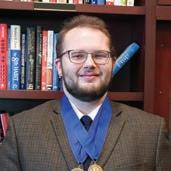
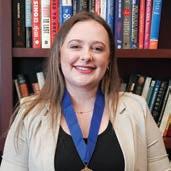

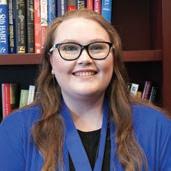
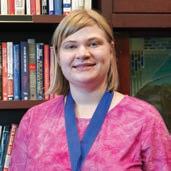
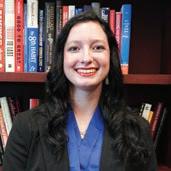
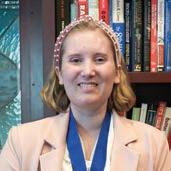
Benjimen Neal
Music Industry
“Survey of Classification Systems Used in US Performance Libraries”
Grover Baker, thesis director
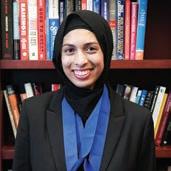
Lacon Parton
Biochemistry
“Antibiotic Resistance eDNA in the Stones River Watershed”
Rebecca Seipelt-Thiemann, thesis director

Shivam Patel
Biology
“Cytopathic Effects of Aurones in a Mouse Cell Line L929 Cells”
Anthony Farone, thesis director
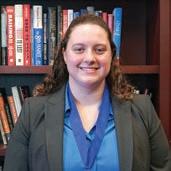
Allyson Pendergrass
History
“Beliefs in Ancient China and Egypt and the Justification for Ruling Classes”
Yuan-ling Chao, thesis director
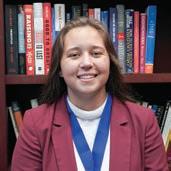
Gwyneth Polak
German/Computer Science
“Digitalizating Deutschland”
Michael Rice, thesis director
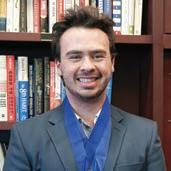
Hannah Price
Horse Science
“Comparative Demographics of English and Western Intercollegiate Horse Shows Association Horses Used in Middle Tennessee”
Alyssa Logan, thesis director
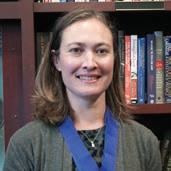
Katelynn Pricer
Political Science (Pre-Law)
“The Supreme Court: Out of Bounds”
Michael Federici, thesis director
Fatima Razzaq
Biochemistry
“Confirming Measures of Social Motivations in Background Strains of Mice Using the Weighted Doors Task”
Tiffany Rogers, thesis director
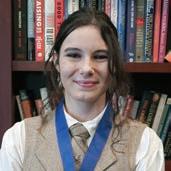
Sydney Robbins
Forensic Science
“Electrochemical Detection of Fenthion for Forensic Analysis”
Charles Chusuei, thesis director
Sydney Robertson
English
“Demystifying The Great Debates: What Really Happened in the Kennedy-Nixon Presidential Debates of 1960”
Kent Syler, thesis director
Sarah Schneider
Political Science (Pre-Law)
“Race and Politics of Marijuana
Criminalization”
Sekou Franklin, thesis director
Ross Sibley
Biochemistry
“Synthesis and Characterization of Cyclic Peptoids Against Cryptococcus neoformans and Candida albicans
Kevin Bicker, thesis director
Elizabeth Smith
Agribusiness
“Air Conditioning for Cows?
Determining the Effects of Heat and Cold Stress on Dairy Cattle Using Applied Economics”
Justin Gardner, thesis director
Micah Steinborn
Anthropology
“Rolling with the Originals: A Personal Foray (Autoethnography) into Gender Roles in Brazilian Jiu-Jitsu as Experienced in Brazil and the US”
Richard Pace, thesis director







Serena Vasudeva
Journalism
“Using a Podcast to Raise Awareness for Issues within the Foster System and Lift the Voices of Ex-Foster Youth”
Leon Alligood, thesis director
Cai Ward
Management and Leadership
“The Interplay of Stereotypes and Emotional Intelligence Around Men and Women”
David Foote, thesis director
Eli Ward
Nursing/Religious Studies
“Communicated Commemorabilia: A Creative Project Exploring Christian Recovery”
Rebekka King, thesis director
Hannah Weiss
Commercial Songwriting/German
“Thesis Title: A Study in Scarlet: A Survey of Sexism and Classism Through the Eyes of Rose Dawson in James Cameron’s Titanic”
Christopher Weedman, thesis director
Lily Woods
Finance
“Utilizing Sensory Marketing to Enhance Client-Financial Advisor Relationships”
Lucy Matthews, thesis director





Samuel Baldwin
Audio Production
“The Whole Word’s a Stage: An Experimentation of AoIP and Remote Collaboration”
Michael Hanson, thesis director
Mekalah Bannister
Economics
“Identifying Components of a Hypothetical Assessment of Digital Literacy for Tennessee Students”
Stacy Fields, thesis director


James Barnes
Geosciences
“Geology and Petrology of Core Samples Taken from The Boyd Mine of The Ducktown Mining District in East Tennessee”
Warner Cribb, thesis director
Gabriel Barton
Biochemistry
“Growing Local Freshwater Sponge Gemmules to Adulthood for Preliminary Utilization as Gray Water Filters”
Cole Easson, thesis director
Victoria Bascou
Forensic Science/Dance
“Investigation of Water Effect on Ignitable Liquid Residue
Analysis by Coupling Solid-Phase Microextraction with Direct Analysis in Real Time Mass Spectrometry”
Mengliang Zhang, thesis director
Drew Bray
Mechatronics Engineering/ Professional Physics
“Crystal Cell Solid-State Batteries: Testing and Variations”
Ronald Henderson, thesis director
Isabella Byars
Studio Art
“Hookup Culture in the Modern Society: A Creative Exploration of Its Effects”
Tony Rodriguez, thesis director
Elliot Certain
Social Work
“I Am Your Constituency: Voices and Perspectives of LGBTQ+ Tennesseans on Anti-LGBTQ+ Legislation”
Roberta Chevrette, thesis director
Anna Collins
Agribusiness
“The Ordinary Price of Zero”
Justin Gardner, thesis director
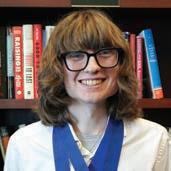
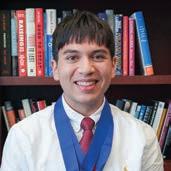

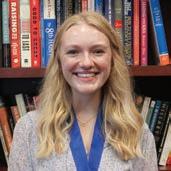
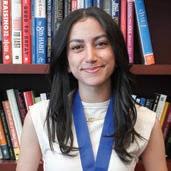


Jacob Davenport
Global Studies and Human Geography
“Identifying Challenges for the Foreign-Born Japanese Population in the Nashville Metropolitan Area”
James Chaney, thesis director
Antonio Dodson
Economics
“Past and Present: Preserving Dollar Dominance and the Reserve Currency Status”
Stuart Fowler, thesis director
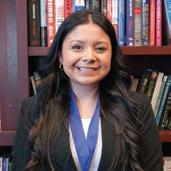
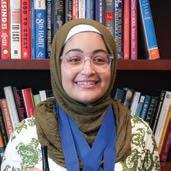
Madalyn Dye
Psychology
“Neurodiversity and Dyslexia: Questioning the Potential Gifts of Dyslexia”
Tim Odegard, thesis director
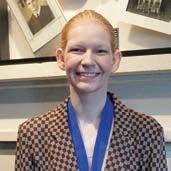
Alexis Flick
Organizational Leadership
“This is NOT a Love Story”
Jennifer Kates, thesis director
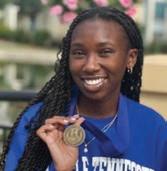
Karmina Ghobrial
Biology
“Exploring Coffee Silverskin Extract's Effects on Age-Related Gene DVE-1/SATB1 During UV-Induced Oxidative Stress”
Rebecca Seipelt-Thiemann, thesis director
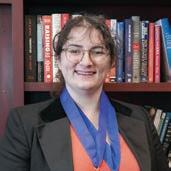
Eboni Godwin
Political Science
“Exploring Grief Through Dance”
Angela Ramos, thesis director

Trevor Golter
Professional Selling
“The Benefits and Nuances of Reaction Videos: A Study of the Effects of User-Generated Content When Marketing Video Games During Pre-Release”
Diane Edmondson, thesis director
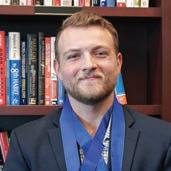
Rose Gutierrez
Biology
“Electromagnetic Ionization and Radiation Creation in Neuroblastoma Cancer Cells Using an Infrared Laser Trap”
Daniel Erenso, thesis director
Rawan Haj-Hussein
Physiology
“Neuronal, Huntingtin Aggregation in the Wings of Adult Drosophila melanogaster”
Kiel Ormerod, thesis director
Madison Hatcher
Biology
“Screening Tetragenococcus halophilus for Bacteriophage in Smokeless Tobacco Production Streams Fermentation Process”
James Robertson, thesis director
Trinity Henderson
Political Science/Spanish
“Black Political Engagement and Political Progress in 21st Century Panama: Afro Panamanian Cultural Organizations and Celebrations as Political Resistance Toward Societal Progress”
Mary Evins, thesis director
Vanessa Jarman
Theatre
“Write, Rewrite: A Play Highlighting How the Fanfiction Format and Community Help Cultivate Confidence in Queer Young Adults”
Claudia Barnett, thesis director
Liadan Jenkins
Anthropology
“Identities in Flux: Social Media as Insight into Cultural Identity—A Case Study of Japanese-Brazilian Migrants in Belem, Brazil”
Richard Pace, thesis director
Cole Jones
Management and Leadership
“An Exploration to Uncover How Boys and Girls Clubs Help Youth Flourish”
Timothy Moake, thesis director







Elishaday Kassa
Business Innovation and Entrepreneurship
“Effects of Growing Up Throughout Childhood in a Multicultural Environment Amongst Young Adults”
Tom Brinthaupt, thesis director
Tara Kirkpatrick
Psychology
“Assessing the Relationship Between Religious Beliefs and Death Anxiety: An Explorative Study”
James Houston, thesis director
Aaralyn Ledridge
Anthropology
“Challenging the Western Lens: Female Genital Cutting and the Complex Intersection of Human Rights and Cultural Meaning”
Ida Leggett, thesis director
Isabelle Legrain
Environmental Science
“The Capacity of Conservation and Regenerative Organic Agriculture to Positively Influence Soil Bulk Density, Soil Organic Carbon, Total Nitrogen and Microbiology”
Samuel Haruna, thesis director
Kalub Levinson
Leisure and Sport Management
“Interpersonal Coaching Styles’ Effect on an Athlete’s Motivation”
Steven Estes, thesis director





Emma Lloyd
Forensic Science
“The Use of Isotopes by Forensic Anthropologists and Archaeologists for the Analysis of Human Remains: An Exploratory Study”
Tiffany Saul, thesis director
Erika Marcrum
Industrial-Organizational Psychology
“Integrity, Personality, and Grit: Can Written Tests Predict Behavior?”
Mark Frame, thesis director


Mikayla Massey
Business Innovation and Entrepreneurship
“The Educational and Personal Impact of a Study Abroad Course”
Ray Wiley, thesis director
Connor Mosburg
Psychology
“The Use of Humor to Alleviate Acute Stress in Undergraduate Adults”
James Loveless, thesis director
Zoe Naylor
Journalism/French and Francophone Studies
“Exploring the Value of Professors’ Investment in Personal Connections with Students”
Christine Eschenfelder, thesis director
Keira Pfefferkorn
Biology
“A Progressive Genetic Approach to Enable The Economical Utilization of Lignocellulosic Hydrolysates for Bioethanol Production”
Elliot Altman, thesis director
Leah Piccirillo
Music Performance
“Oboe Reed-Making: An Analysis and Discussion of Current Practice, Limitations, and Technology Associated with Mass Production”
Keith Sorrels, thesis director
Brianna Raines
English
“McQuiston and Quindlen: The Characterization of Lesbian Relationships in Young Adult Novels in the South”
Jennifer Marchant, thesis director
Adriana Ramirez Speis
Political Science
“Unsparingly: A Podcast Exploring the Mental Health of Medical Professionals Working in an Acute Care Setting Before, During and After the COVID-19 Pandemic”
Ciera Schoonover, thesis director




Kera Reynolds
English
“A Look at University Social Connections and Its Impact on At-Risk First Year Students
Residing in MTSU Housing and Residential Life”
Amy Korstange, thesis director
Justin Ritter
Psychology
“Social Media and Self-Talk: Exploring Self-Talk Related Motives for Social Media Use and Links Between Social Media Usage and Self-Talk Frequency”
Tom Brinthaupt, thesis director
Matthew Siciliano
Political Science
“A History of Gerrymandering: Effects, Issues, and Solutions”
David Trowbridge, thesis director



McKenzie “Max” Thomas
Visual Arts
“Toward Eternity: An Artistic Exploration of Death and the Fear of Dying”
Erin Anfinson, thesis director

Morgan von Doehren
Music Industry/Audio Production
“Time is Ticking, Expressing Grief through Time: Exploring the Production and Creative Techniques for a Composition for Flute and Electronics”
Deanna Little, thesis director
Jackson Wade
Mechatronics
Engineering
“RC You Later: Development of a Remote-Controlled Hovercraft with First-Person View Capabilities”
Elissa Ledoux, thesis director
Brielle Walmsley
Flight Dispatch/Aviation
Management
“Examining the Impact of Flight Training Prior to Enrollment in a Collegiate Part 141 Program”
Tyler Babb, thesis director
Briley Welch
English
“The Spectrum of the Human Condition: A Character Analysis of Albus Dumbledore and Severus Snape in J.K. Rowling’s Harry Potter Series”
Jennifer Marchant, thesis director
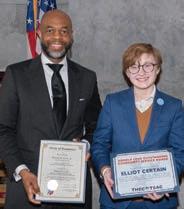
MTSU Honors students Elliot
Certain and Brian Maxwell were among 10 individuals in higher education bestowed 2024 Harold Love Outstanding Community Service Awards at the state capitol recently.
The Tennessee Higher Education Commission administers the award to five students and five faculty/staff members each year in honor of late state Rep. Harold Love Sr.
“I work very hard to better my community, and it’s nice that others can benefit from the results of my work,” Certain said.
An Honors Transfer Fellow and Social Work major, Certain has worked with several organizations, both on and off campus. At MTSU, he is passionate about the American Democracy Project and is founding president
of the Student Social Work Organization. Certain also works with the Tennessee Equality Project, an organization that fights for LGBTQ+ rights in the state legislature.
“Elliot volunteered over 60 hours with the Tennessee Equality Project and provided exceptional work, particularly in his work with the ‘Fighting Injustice Together’ panel,” said Chris Sanders, executive director of the Tennessee Equality Project.
Additionally, Certain interned with the AmeriCorps VISTA program as part of the Literacy Mid-South Program, working with children in Memphis community.
Certain also earned the Carlisle Award, given to the top 10 legislators, at the Tennessee Intercollegiate State Legislature in fall 2023.
Maxwell, 43, was also a Buchanan Transfer Fellow and graduated in May with a degree in Video and Film Production (see related article on page 22).


Collage: A Journal of Creative Expression, an MTSU outlet since 1968 that moved under Honors auspices in 2005, publishes about 60 pieces of work every semester from around 350 blind submissions. Creative Expression Awards are given each edition to top-ranked poetry and prose (named in honor of Martha Hixon), photography and artwork (in memory of Lon Nuell), and sometimes audio, video, and/or song lyrics.
View issues at collage.mtsu.edu
Art
Rachel Booher
A Thousand Wishes
Photography
Sofie Clarke
Shattered Reflections
Poetry
Abigail Wells “1414 N. Rutherford Blvd”
Prose
Abigail Wells “Sidelined”
Audio
Landon Bowling “Metropolitan Day Trip”


By Robin E. Lee and Drew Ruble
Brian Maxwell is an Honors Buchanan Transfer Fellow, a 43-year-old married father of three (his oldest son, Mike, also attends MTSU), and a Video and Film Production major who graduated this spring with a 4.0 GPA.
But Maxwell hasn’t always led such a model life. In 2000, as a young man entering his 20s, Maxwell was arrested (for the first time) for simple possession of marijuana. Between repeat offenses and parole violations, he would spend the next six years in and out of jail.
His story represents two very different lives. But recently, through his volunteer work, Maxwell’s two worlds have collided.
Maxwell is giving back to current inmates in Rutherford County with hands-on training and education in audio and video equipment and production to help them chart a more positive course for their futures. It’s training they would not otherwise be able to receive and is unlike any other correctional education program currently offered in the state. And it is experience Maxwell put toward his Honors thesis.
Maxwell vividly recalls seeing the movie Back to the Future in theaters when he was just 5 years old. He says the movie ignited his passion for film production. He recalls the lights and sounds, the larger-than-life action sequences, and the story itself.
He graduated from high school in 1998 and moved from Horn Lake, Mississippi, to Smyrna, not far from the MTSU campus. He got a job working in a computer room at a book distributor. His goal, though, was to begin film school at MTSU. But life choices altered his plans.
Maxwell had started smoking marijuana when he was 16. He said it helped with his depression. One day, though, he was pulled over by the police for a broken taillight and was caught with marijuana in his car. He was arrested for simple possession.
“The first time I spent in jail, I felt complete shame. There was a pit in my stomach. I couldn’t look up from the floor,” Maxwell said. “[But] it took less than 30 days before I was all smiles and heckling the guards for an extra sandwich. I became institutionalized very quickly.”


You
will never reform criminals by sending them to jail.
Over the next six years, Maxwell was in and out of jail several times. It was always either a new charge for a small amount of marijuana or a probation violation that led to reincarceration.
“I feel like probation is a scheme designed to send poor people to jail. I would fail a drug test or miss a high-dollar payment toward my fines, and they would issue a warrant for my arrest,” Maxwell said. “It was an escalating time frame. The first violation was 30 days, the second was 60 to 90 days, and the third was 90 to 364 days. The longest stretches I did at one time were 180 days and 145 days.
“I was terrified the first time, nervous the second time, and felt like a veteran of the system by the third. I honestly don’t even remember the person I was before my time in jail, and I was confident that I would go to my grave institutionalized.”
Maxwell spent his 21st birthday behind bars at the Rutherford County Correctional Work Center. Sadly, his father passed away while he was incarcerated.

It was 2006 before he was finally clear of the system.
“The air smelled cleaner, food tasted better, and a massive weight was lifted off me mentally,” he said.
Following his final release, Maxwell started working in construction. He worked as much as he could, sometimes earning less than minimum wage, but when he broke two vertebrae in his spine on a construction site, his work opportunities shrank.
“I struggled to find work for about six months because I could no longer lift anything. I was in tremendous pain for about a decade,” he said, adding that for a time he was homeless.
He was fortunate to eventually find a desk job at a storage facility. Then, when the Affordable Care Act passed, he was finally able to get surgery on his fractured back.
“I was no longer in pain and could do things I thought I would never do again,” he said.
At long last, he turned his sights toward his long-held dream of making movies.



Maxwell wanted to study film at MTSU. But first he needed to establish himself as a good student. He used the Reconnect Grant to attend Motlow State Community College, where he became an honors student. After completing his associate degree at the Smyrna campus, he took advantage of MTSU’s Honors College Transfer Fellowship to enroll at MTSU.
Honors students at MTSU must complete a thesis before graduation. Maxwell’s thesis details his life, but part of it also reflects on his passionate volunteer work at the Rutherford County Correctional Work Center, where he was once imprisoned.
On a weekly basis, and using his own equipment, Maxwell teaches current inmates about video and film production, as well as soft skills they wouldn’t otherwise learn while incarcerated. The inmates receive hands-on experience with audio recorders, microphones, boom poles, slates, cameras, tripods, and editing software.
“I speak their language, and that is more important than any of my actual knowledge,” Maxwell said. “I connect with them on a deeply emotional level due
to our shared experiences; I want to be an example of who they can be. The situation they are in does not define who they are.”
Maxwell hopes that those he is teaching might now have a path forward if they choose to pursue it after his lessons with them are complete.
I was confident that I would go to my grave institutionalized.
“You will never reform criminals by sending them to jail. All you do is normalize the experience for them while making them more efficient criminals at the same time,” he said. “Instead of being in situations where they can learn a skill or take a parenting class, inmates are instead offered 20 hours a day in their cell with a few hours to waste playing card games in a slightly bigger room. You must educate and uplift to reform a person.”
It’s not the only volunteer work Maxwell is involved with. He has also helped at Ables Recreation for people with disabilities, Adam’s Place and The Waterford retirement homes, and several local libraries for children’s book readings, in addition to raising thousands of dollars in donations for Autism Speaks (Maxwell’s other two sons, Keith, 15, and Kevin, 14, have autism).
Before graduation in May, he received the MTSU Community Service Award, the statewide Harold Love award for community service, and the Outstanding Nontraditional Student Award from MTSU’s June Anderson Center for Women and Nontraditional Students. He also was selected for the first Chapter 246 Phi Kappa Phi Graduate Scholar Award to use while working on his graduate degree at MTSU in 2024–25.
Maxwell said he enjoys teaching and plans to pursue a master’s degree in filmmaking.
Beyond that, he wants to keep making movies with his son Mike, who is also majoring in Video and Film Production with minors in Mass Communication and Honors at MTSU.
“In a perfect world, we find funding and get to make a big budget Hollywood movie,” Maxwell said. “[But] I’m more of a live-in-the-moment and take-it-as-it-comes guy, so if the winds blow right, I’ll follow the breeze.” A

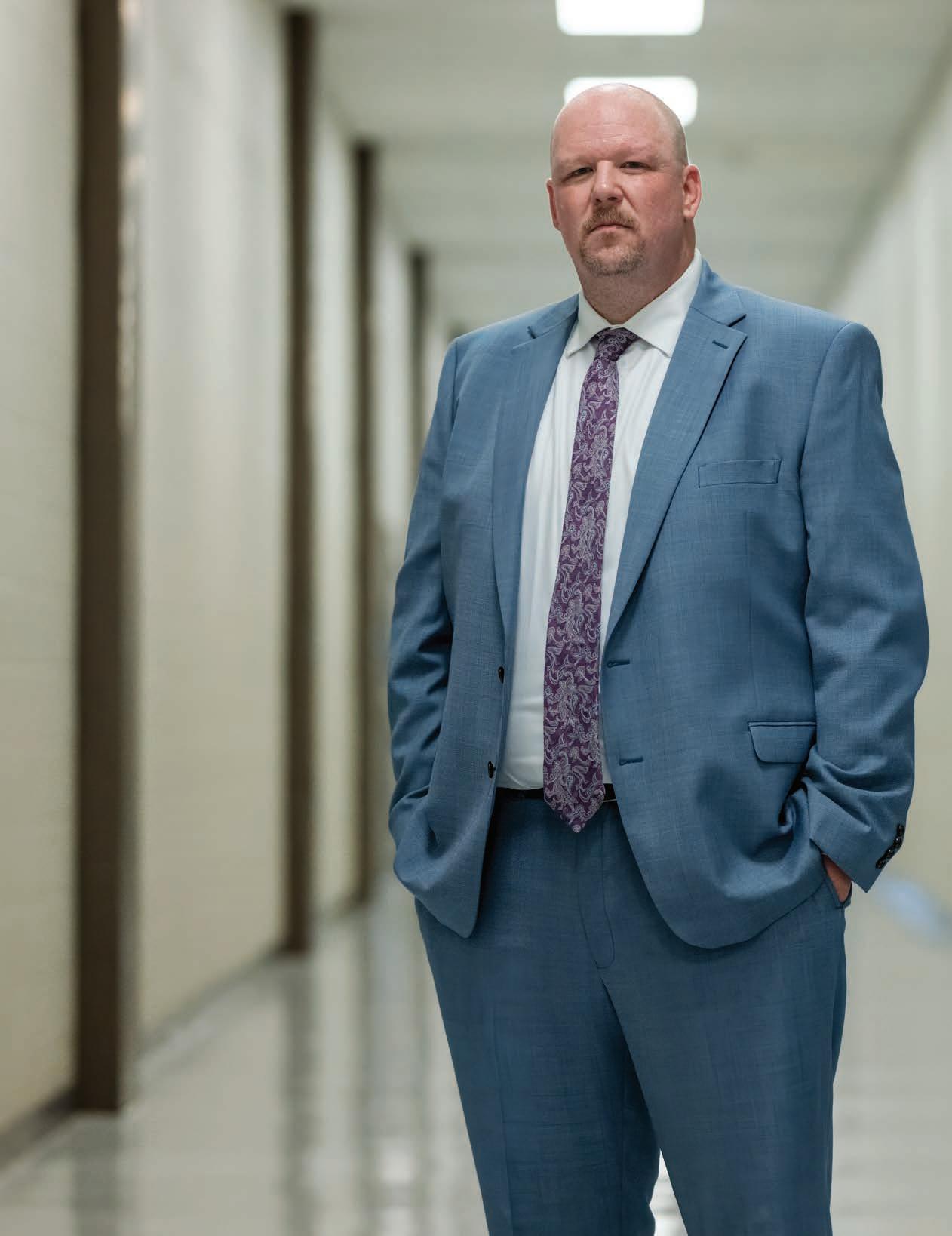

One of the outstanding students in MTSU’s Quantum Physics Initiative, Ariel Nicastro is racking up awards and undergraduate experiences in her early years at the University.
A Buchanan Fellow who just started her junior year, Nicastro became one of only 10 students from Tennessee institutions and among just 430 students nationwide selected as 2024 Goldwater Scholars. The prestigious award identifies and supports the next generation of research leaders in the fields of natural sciences, engineering, and mathematics.
“Research is never a linear path of success, so I feel that earning this honor after many diverse research experiences is a testament to my persistence and resilience,” she said.
The Goldwater Scholarship will provide recipients up to $7,500 maximum per full academic year; sophomores receive support for four semesters or until graduation, if sooner.
“Ariel embodies the qualities every advisor hopes for in a student: intelligence, diligence, talent, and unwavering drive. This esteemed award is a well-deserved recognition of Ariel’s exceptional contributions to research at MTSU,” said Hanna Terletska, associate professor of Physics and Astronomy.
Nicastro also was awarded a Science Undergraduate Laboratory Internship at Oak Ridge National Laboratory last summer as one of four MTSU quantum physics students recognized as Amplify Scholars.
As a first-year student, Nicastro was chosen in 2023 to participate in the Training and Research Experiences in Nonlinear Dynamics, a 10-week summer research experience for undergraduates (REU) at the University of Maryland. She also studied abroad in New Zealand that summer.
Additionally, she has attended an Undergraduate Women in Physics conference at Auburn University, presented at the Tennessee Collegiate Honors Council, and presented at the National Conference for Undergraduate Research in both 2023 and 2024.
After being assigned a mentor her freshman year as a Physics major, Nicastro almost immediately inquired about a suitable starter research project.
“I assigned her a research project that involved electrical measurements of filter circuits. Despite having no background in the use of equipment such as function generators, BNC connectors, and oscilloscopes, Ariel became adept at making measurements,” said her mentor, William Robertson, a Physics and Astronomy
professor. “She succeeded through persistence and the ability to ask good questions, talents that will continue to ensure her continued success in science.”
Nicastro is president of MTSU’s Quantum Computing Club, treasurer of the MTSU Society of Physics Students, secretary for the Student Organization for the Advancement of Research, and viola section leader of the MTSU Symphony Orchestra. She is a member of the Women in Physics Club, Astronomy Club, and MTSU Chamber Orchestra, plus previously volunteered with the Tennessee Girls in STEM. Awards at MTSU also include the Physics and Astronomy faculty award, Paul W. Martin Scholarship, Outstanding Honors First-Year Student, and MTSU School of Music Scholarship.
Research is never a linear path of success, so I feel that earning this honor after many diverse research experiences is a testament to my persistence and resilience.
She plans to pursue a Ph.D. in condensed matter physics after graduation, conducting research on quantum materials and nanotechnology. With the Goldwater under her belt, she is considering applying for the DAAD-RISE internship next summer in Germany and an internship at a STEM-related workplace.
“I am still exploring my fields of interest, so I hope I can utilize these internships to learn more about which fields I am motivated to pursue in graduate school and beyond,” she said. “I am currently passionate about condensed matter physics and quantum physics, so I will continue to seek out more opportunities in these broad fields.”
LEARN MORE
Students interested in applying for the Goldwater Scholarship, or other national and international awards, should email Laura Clippard, international fellowships coordinator, at laura.clippard@mtsu.edu
MTSU debate coach (and Honors associate professor) helps University win 11 national championships
By Skip Anderson

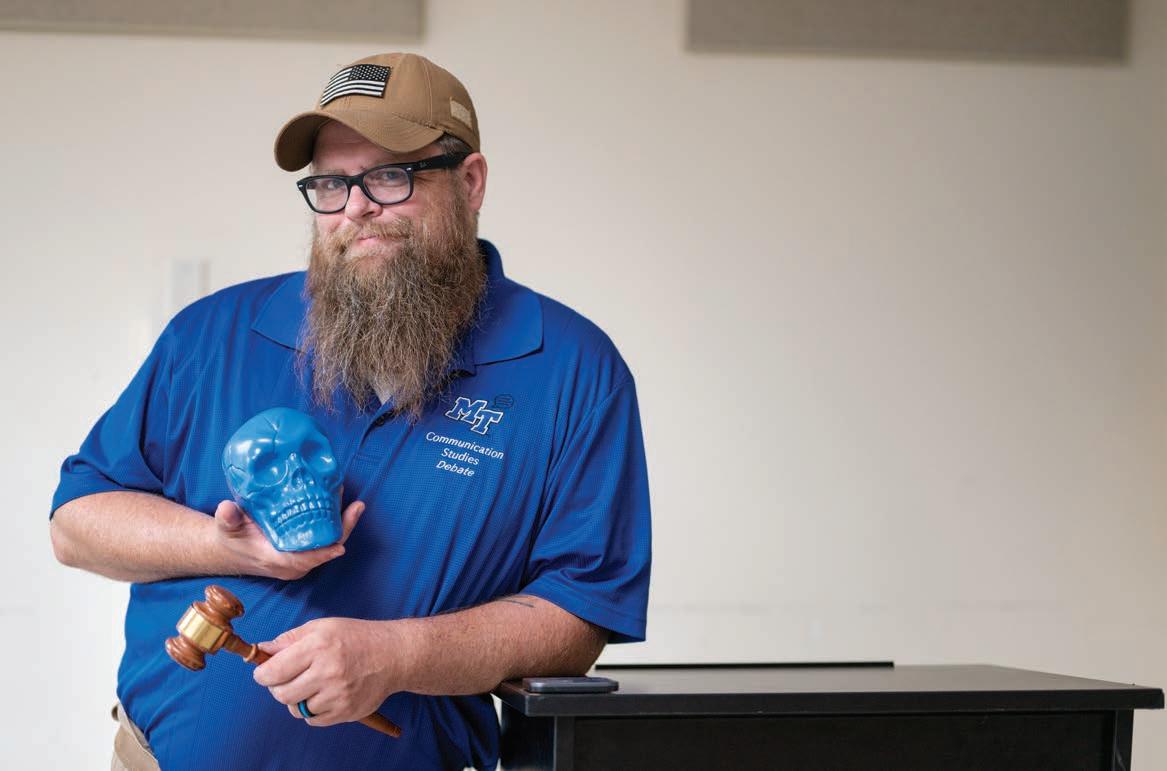


Pat Richey, MTSU’s director of forensics, who has coached the Blue Raider debate team to 11 individual and team national championships, doesn’t remember when he won his first argument. But he remembers vividly when his then 4-year-old daughter Abby first outwitted an opponent—her mother.
“Her mom said she could bring one Barbie doll with her on a trip,” Richey said. When Abby’s mom noticed that the child had in fact brought two dolls, she queried her daughter, saying, ‘I thought I said that you could bring one doll, not two.’ ”
“No,” Abby calmly corrected her mother. “You said I could bring one ‘Barbie’ doll. This other one is Tiana from a Disney movie.”
“I told my wife, ‘She gotcha!’ ” said Richey, who is also an Honors associate professor of Communication Studies at MTSU.
Like Richey, his wife, Becky Joyce, was a military kid. And, like him, she is outstanding at debate. The couple, now married 22 years, even met at a debate and would later become debate partners. In fact, he proposed to her while they were at a debate in Toronto.
“I wanted to ask her [to marry me] at Niagara Falls,” Richey said. “But the falls were frozen over. So I took her to a nice restaurant instead.”
The couple also have a son, Robert, who at 13 is four years younger than Abby.
“Becky was very good at debate,” Richey said. “She’ll tell you she wasn’t, but she was. She wins more of the debates at home than I do. So I’ve really learned to pick my battles.”
Now it’s his students who take up the battles at competitions.
MTSU’s debate team, despite being outmatched in size by nearly 4 to 1 compared to many of the schools it competes with, is a heavyweight in college debate and has won 11 national championships since Richey became coach in 2011.
“We are a really small program, and we’re very student-centric,” he said. “We have a terrific assistant coach in Dr. Natonya Listach, but we don’t have a lot of money, so we’re largely student-run; the captains do a lot of heavy lifting, which gives them life skills like how to manage people.”
According to Richey, the quality of students on the Blue Raider debate team makes up for what it lacks in numbers.

“We have real talent in the student population at MTSU,” Richey said. “We can hold our own against flagship institutions.”
Richey understands the passion his students have for debate. He himself first became interested in debate in middle school when he took a mandatory class that split its time between theater and debate. And although he was on the debate team in high school, forensics hadn’t yet sparked his nascent interest into a lifelong passion.
He was a self-described “meh” student in high school who would have rather worked on a car than work out a persuasive argument. Despite that, he showed promise as a debater.
I was doing debate in college and about to get out of the military when 9/11 happened.
“I won the first debate I had,” he said, referring to New Mark Middle School in Kansas City, Missouri, before continuing to the next level. “Oak Park High School was a debate powerhouse by the time I got there. However, high school forensics can become extremely toxic and far too competitive. It was still just something for me to do rather than it being a true passion.”
After graduation, that changed.
“I joined the Army Reserves, and that put me on a straight track,” Richey said. “I was doing debate in college and about to get out of the military when 9/11 happened.”
The government almost immediately issued a stop-loss order.
“A stop-loss order means they hold onto people with certain skill sets: pilots, medics, special forces, and so forth. As a result, I spent nine years in the military on a four-year contract,” he said. “I was at Louisiana Christian College in Pineville at the beginning of my senior year when the planes hit the twin towers.”
As a civil affairs sergeant, his skills were also in demand. Attached to the 4th Infantry Division out of Tikrit, Richey served in Iraq during the invasion and the following year.
Civil affairs officers are responsible for serving as a liaison between a “host community” and the military.
“Civil affairs are involved before, during, and after a war,” Richey said. “Before and during a war, we make sure civilians are off the battlefield, and we mark the heritage sites. After conflict, we help rebuild. In Iraq, we had a tough task as there was very little infrastructure left—no water, no electricity, and very little sanitation.”
Being deployed in a war zone largely meant that he wasn’t able to do a lot of formal debating. However, there was one notable exception.
“While I was in Iraq, I was in an online debate,” he said. “I debated for the fictitious University of Baghdad, and I ended up winning it. We did that via satellite; this was long before smart phones. I ended up winning it.”
So, what’s the key to MTSU’s winning ways?
“I teach the students that if you learn to do debate right, the wins will come,” he said. “And sometimes the best win comes when you lose, meaning a person may have truly beat you and you have to accept that. I tell the team, there’s no such thing as a debater who can’t be beat, including you.”
He also takes an underhanded approach to their training, in a way.
“When I practice with the students, I use every dirty trick I can think of,” Richey said. “That way I can see them process [something unfair happening] and see how they're going to respond.”
A “dirty trick” in debate could be as simple as misrepresenting the words the students say.
“So, for instance, I might say, ‘You said this was the
MTSU has a long-standing debate tradition that harkens back to the earliest days of the school.
Middle Tennessee State Normal opened in 1911. Male students founded the first literary society (the forerunner of modern debate teams), the Claxton Society, the same year. The following year another group of male students founded the Henry W. Grady Literary Society; soon to follow were two women’s literary societies. At first the literary societies (mostly the two men’s societies) debated each other.
In the early 1920s Middle Tennessee began to send its best debaters to East Tennessee Normal and West Tennessee Normal (now East Tennessee State and the University of Memphis) while at the same time, these schools would send their best debaters to Middle Tennessee. These public presentations were special events, and people from Nashville would come to hear the speakers. Andrew L. Todd, former speaker of both the Tennessee Senate and the House of Representatives, was not only one of the founders of the school but also a major proponent of the debating program. He personally paid for the prize medallion for round robin debate.
The debaters spoke on issues such as women’s suffrage and states’ rights. Middle Tennessee expanded its traveling range and often debated in Virginia, Alabama, Mississippi, and Georgia. The literary societies
case,’ when they clearly didn’t,” he explained.
Richey also reminds them not to let go of reason by getting dragged into an emotional debate.
“I remind them that it’s not about winning that argument, it’s about convincing the judge with logic that you’re right.” he said. “I also want my students to kill their opponents with kindness. A lot of people will get very upset, and when that happens they just collapse. Using dirty tricks on them when practicing, [it] conditions them for that. It teaches them to relax and work through the problem.”
Recent graduate Elliot Certain, a Social Work major with an Honors minor, also praised debate’s real-life merits.
“Life’s really built on communication,” he said. “Whenever you’re in conflict, for some people, their first reaction is to get really red in the face and start screaming, throwing things.
“[Debate] teaches you how to stay calm in conflict and actually reach a resolution, not just . . . fight. And that’s something that any major can benefit from. . . . It’s a fundamental of human communication.” A
began to decline in the late 1930s because of the Great Depression and finally phased out during World War II.
After WWII, modern debate teams as we now know them began. The teams were specifically designed to debate other teams on centralized topics, with a coach rather than a student leading the team.
Middle Tennessee was no different. In 1948 Lane Boutwell began coaching the team. He brought the Pi Kappa Delta forensics honor society to campus in 1952. The team grew and became very successful under the leadership of coaches James Skeine, David Walker, Jim Brooks, and Russell Church. The team regularly won many prestigious tournaments and awards in regional and national tournaments and sent three teams to the National Debate Tournament Championship. The team also was active on campus hosting the British Debate Series from the 1970s forward and campus forums on local, state, and national issues.
Researching and debating the national debate topic of product safety in 1976–77, the team contributed significant research and personal testimony to state legislators as Tennessee led the nation in passing the first state law requiring children to use child safety seats in automobiles.

By Laura Clippard
Like many of my students’, my roots are planted in a small Tennessee town, a place where academic opportunities were sparse, but dreams were plentiful. My earliest interest in Germany was sparked by a German class in high school—a flame that was further fanned by the captivating stories told by my Austrian mother-in-law, who lived the early part of her adult life there.
Despite financial hurdles that limited my early experiences, my dedication to engaging with international academic landscapes continues to grow, especially after witnessing the transformative impact of my daughter’s study abroad journey in Japan. I was beyond honored to be selected as the first representative from MTSU for the Deutscher Akademischer Austauschdienst (DAAD) Germany Today tour in June. I joined 21 academic colleagues from leading universities from across the United States and Canada.
Germany Today is designed to give participants a broad look at that nation’s higher education landscape, including details about bachelor’s and master’s programs as well as doctoral training at a spectrum of German institutions. The weeklong tour explores innovative projects and structural reforms in higher education.

The tour discussed new opportunities and challenges for universities, including adapting to enrollment changes, matching job market expectations, and embracing diversity in the student body. This experience reinforced my commitment to opening doors for students to global educational and research opportunities.
Seeing Germany for the first time was an awe-inspiring experience. Germany is a beautiful country characterized by its lush green spaces, colorful trains, and a harmonious blend of historical buildings and modern technology. The people are friendly and helpful, making it a welcoming destination for educational opportunities.
We began our journey in Frankfurt, a vibrant global hub known for its commerce, culture, education, tourism, and transportation. We also visited the Trumpf Factory, observing the use of machine tools and lasers for manufacturing. And we explored Reutlingen University, which is dedicated to shaping the future sustainably on local and global scales.
One of the most remarkable aspects of Germany is its commitment to transitioning away from coal and nuclear power. My favorite part of the trip was witnessing the innovative practices at Augsburg University, such as using sheep for lawn maintenance.
As an Honors College advisor and head of the Undergraduate Fellowships Office (UFO), I engage with a diverse array of individuals within the MTSU community, including minority, first-generation, and low-income students and those from immigrant families, which


enriches our academic fabric. My position is responsible for advising students about national and international programs, and leading public speaking engagements. Additionally, I serve as a national Gilman Advisor Ambassador, further engaging with those on campus.
The UFO promotes academic and scientific fellowships and scholarships that allow students to pursue further study in their future career fields, in the U.S. and internationally. These programs help students with funding for study abroad, research experiences, graduate school, and more. It has been rewarding to see the enthusiasm from students toward applying for various opportunities.
Through direct conversations with faculty and senior leaders at diverse German institutions, I have learned extensively about their higher education system. I will continue to champion interdisciplinary partnerships and support underrepresented students in accessing international opportunities. I plan to leverage this knowledge to help my students apply for Germanyrelated international fellowships and to offer additional support to the wider MTSU community, including faculty. This experience has been profoundly life-changing. I made new friends, gained a deep understanding of the German educational system, and developed valuable resources for our students. The opportunity to participate in the DAAD Germany Today tour represents a pivotal moment in my professional journey that aligns strongly with my enduring commitment to foster global educational exchanges.
This experience reinforced my commitment to opening doors for students to global educational and research experiences. A


Honors alumna Brittney Johnson, MTSU’s first recipient of the prestigious Gates Cambridge Scholarship, triumphed over challenges as a first-generation, low-income college student. Now she wants to use her current postgraduate studies at the University of Cambridge in England to help others overcome inequities and their less-fortunate circumstances.
Johnson, a native of Martin, secured the extremely competitive international scholarship earlier this year—it is typically awarded to only 1.3% of applicants.
At MTSU, where she graduated with dual degrees in Spanish and in Global Studies and Human Geography and a minor in Economics in 2020, Johnson was a member of the University’s chapter of UNICEF. The organization works to assist disadvantaged children and adolescents in 190 nations around the world.
“This early exposure to the far-reaching consequences of educational inequities left an indelible mark on my
worldview and instilled a deep sense of purpose in me,” Johnson said. “Throughout my childhood, I developed a growing interest in the world beyond my tight-knit community.
“I tailored my undergraduate studies to create an interdisciplinary education that explored subjects in international politics, language-learning, economics, world history, and human rights. At Cambridge, I plan to explore innovative approaches that can effectively remove obstacles to learning and ensure the inclusion of all children and young people, regardless of their backgrounds or abilities.”
At Cambridge, Johnson is interested in researching development and implementation of anti-racist and inclusive curricula, particularly in diverse educational settings, while earning her Master of Philosophy.

Originally planning to attend law school and work in immigration law, Johnson altered her plans during her first year of teaching abroad following her first Fulbright grant.
As an MTSU student, Johnson was awarded two Fulbright grants as an English teaching assistant in Spain and a Benjamin A. Gilman Scholarship.
“I studied abroad in South America as a Gilman Scholar and taught English language classes to immigrants, refugees, and asylum seekers at a local literacy nonprofit,” she said. “Through these experiences, I noticed an increasing overlap between what I was learning regarding economic and political theories and their reciprocal impact on education.
“The lack of educational access and resources perpetuated cycles of marginalization and exclusion, creating barriers that hindered the integration and empowerment of vulnerable communities. I look forward to the perspectives and guidance” of Cambridge’s Faculty of Education.
As a Gates Cambridge Scholar, Johnson also will become part of a global network of scholars and alumni who use their education and leadership qualities to improve the lives of others.
“I can confidently say that Brittney is one of the most well-rounded and ambitious students I’ve ever taught. She is a truly compassionate person who demonstrates a sincere appreciation for other cultures and people,” said James Chaney, associate professor in MTSU’s Global Studies and Human Geography program. “Brittney exemplifies the kind of student MTSU strives to produce, and I am excited to see what the future holds for her as she embarks on the next chapter of her life at the University of Cambridge.”
A Presidential Scholar and Phi Kappa Phi member at MTSU, Johnson also volunteered as an Exchange Buddy to new international students, “aiding them in their transition to a new culture,” said Laura Clippard, MTSU undergraduate fellowships specialist. In summer 2023, Johnson worked as a staff member with low-income and first-generation high school students in the Upward Bound residential program, “encouraging them to seek out college opportunities,” Clippard added.
Johnson and Clippard also co-wrote an article for the Gilman Scholarship program, “Great Partnerships: The Gilman to Fulbright Pipeline,’” aimed at introducing low-income students to Fulbright opportunities. And Johnson has volunteered in other ways, such as assisting another MTSU student with her Fulbright application as part of an interview committee.
“As a cultural ambassador for both the Fulbright and Gilman scholarships, she has demonstrated a remarkable ability to connect with people from diverse backgrounds,” Clippard said.
Leah Lyons, dean of the MTSU College of Liberal Arts, said Johnson’s majors “allowed her to leverage her deep understanding of global politics, world history, language learning, and intercultural competency to qualify for this distinct honor. Her passion for human rights and her incredible work ethic are greatly to her credit, and they are also representative of what MTSU students can accomplish.”
Throughout my childhood, I developed a growing interest in the world beyond my tightknit community.
The Gates Cambridge Scholarship will cover full cost of attendance, including a $25,000-plus allowance, roundtrip airfare, visa and immigration health surcharge costs, and discretionary funding such as fieldwork and dependents.
“I discovered my genuine passion for education and its ability to set students up for success,” Johnson said. “While I derive great satisfaction from working in the classroom, my overarching career objective is to effectuate broader change within education policy.”
For information on applying for national and international awards, visit honors.mtsu.edu/ufo or email laura.clippard@mtsu.edu
Fulbright Canada-Mitacs Globalink Research Internship
Jake Salter, Computer Science
Summer Fulbright Institute in Wales
Victoria Grigsby, Political Science/German
Barry Goldwater Scholarship
Ariel Nicastro, Physics
Gilman Scholarship
Febronia Azer, Computer Science, and Jasper Sanders, Animation (Germany, Poland, Czech Republic, and Switzerland)
John Farris, Aerospace (New Zealand)
Logan Gordon, Foreign Languages (Japan)
Victoria Grigsby, Political Science/Foreign Languages (Germany)
Alexis Mahon, Political Science, and
Bryce Tall-LaRue, Audio Production (Senegal)
Jessica Stites, Data Science (Germany, Czech Republic, Netherlands, and France)
Grace Young-ah Sandidge, Geoscience (Switzerland)
RISE Germany Scholarship
Samuel Apigian, Mechatronics Engineering
Gates Cambridge
Brittney Johnson, Spanish/ Global Studies and Human Geography
Phi Kappa Phi Marcus L. Urann Fellowship
Rachel Booher, English
Phi Kappa Phi Study Abroad Scholarship
Ethan Estes, History
Gresham Groves, Psychology
Bridging Scholarship for Japan
Rachelle Laurel, Marketing/Japanese
Harold Love Outstanding Community Service Award
Elliot Certain, Social Work
Brian Maxwell, Film and Video Production
National Science Foundation (NSF) Graduate Research Fellowship
Dara Zwemer, Psychology
Monika Fouad, Physics and Astronomy
NSF Research Experiences for Undergraduates
Carlos Aldana Lira, Professional Computer Science
Izzy Jacober, Psychology
Lula Badriche, Physics
Elijah Atkins, Computer Science
Skye Neal, Chemistry/ Mathematics
Science Undergraduate Laboratory Internship (at Oak Ridge National Laboratory)
Ariel Nicastro, Physics
MTSU President’s Award
Ross Sibley
MTSU Provost’s Award
Sydney Robbins, Forensic Science
MTSU Community Service Award
Brian Maxwell, Video and Film Production
MTSU Robert C. LaLance Jr. Achievement Award
Sarah Kamaridinova, Biology
Gordon and Sara Bell Native American Studies Scholarship
Madison Reeves, Elementary Education
Lawrence R. Good Scholarship
Delaney Reynolds, Environmental Science/ Global Studies
Ralph and Elizabeth Gwaltney Centennial Scholarship
Hailey Harrison, Aerospace (Professional Pilot/ Flight Dispatch)
Creighton and Elizabeth Hay Rhea Centennial Scholarship in Honors
Delaney Thomas, Biology
Hannah/Harris Study Abroad Scholarship
Jenene Grover, Journalism
Michael Martinelli Memorial Scholarship
Lena Eccles, Nutrition and Food Science
Zander Sullivan, Aerospace (Professional Pilot)
Philip and Marilyn Mathis Scholarship
Matt Johnson, Biochemistry
Bart McCash Scholarship
Sav Buist, Biology
June McCash Founders Award Scholarship
Jael Guest, Foreign Language
Joseph and Teresa Olmstead Scholarship
Maheswari Ramesh, Aviation Management
Julia W. Powell Scholarship
Fison Bogale, Nursing
John and Linda Vile Award
Victoria Grigsby, Political Science/German
Vincent and Stacey Windrow Award
Cai Ward, Management and Leadership
Hanna Romans Witherspoon Scholarship
Lillian Laman, History
Academic Achievement
Scholarships
Ethan Estes, History
Ellaleigh Hall, Nursing
Isabelle Legrain, Environmental Science
Paul W. Martin Sr. Scholarships
Katrina Aguilar, Political Science
Hannah Antrican, Psychology/Sociology
Jorge Avila, Political Science
Rashieq Cockerham, Biology
Luis Esmurria, Business Administration and Management
Nathaniel Harrison, Accounting
Rand Hasan, Biochemistry
Izzy Jacober, Psychology
Sarah Kamaridinova, Pre-Dental
Ariel Nicastro, Physics
Connor Prim, Instrumental Music Education
First-Year
Outstanding Students
Luis Esmurria, Business Administration and Management
Hannah Ferreira, Psychology/ Political Science
Second-Year
Outstanding Students
Jorge Avila, Political Science
Anna Collins, Agribusiness
Third-Year
Outstanding Students
Elizabeth Counts, Nutrition and Food Science
Karmina Ghobrial, Biology
Fourth-Year
Outstanding Students
Trinity Henderson, Political Science/Spanish
Ross Sibley, Biochemistry
Paul W. Martin Jr.
Distinguished Alumni Award
Mary Wilgus (’73), first Honors thesis at MTSU
Paul W. Martin Jr.
Distinguished Alumni Award Scholarship
Aykut Iri, Finance (in honor of Mary Wilgus)
Outstanding Honors Faculty Award
Mary Evins, History/American Democracy Project
Exemplary Faculty Service Award
Katie Foss, Journalism and Strategic Media
Exemplary Staff Service Award
Franck Mukendi, Information Technology Division
Sav Buist, Biology major and Buchanan Transfer Fellow, is an accomplished musician and is touring with country music artist Lainey Wilson through the Fall 2024 semester.

Mechatronics Engineering major John Aduroja won the novice division of the sixth annual Tennessee Valley Debate competition. He was also awarded fifth-best speaker.
Carlos Aldana Lira, a Computer Science junior, was awarded a Research Experience for Undergraduates (REU) at the University of Washington to conduct computer science education research over the summer of 2024.
A senior Mechatronics Engineering major and Buchanan Fellow, Samuel Apigian landed a Deutscher Akademischer Austauschdienst (DAAD) Research Internship in Science and Engineering (RISE) in Dresden, Germany, this past summer.
Buchanan Fellow Elizabeth Cannan-Knight, Sociology and Communication double-major, was awarded 2024 LGBT+ Advocate of the Year.
Biology and Psychology doublemajor Sierra Cruz was presented Undergraduate Student of the Year.
A new group of Honors Student Ambassadors were initiated: Alexis Flick, Karmina Ghobrial, Jael Guest, Jenene Grover, Rand Hasan, Trinity Henderson, Izzy Jacober, Elizabeth Kowalczyck, and Ross Sibley.
Buchanan Fellow Hannah Ferreira was one of two students at MTSU selected as the University’s inaugural Andrew Goodman Foundation ambassadors. Ferreira is doublemajoring in Psychology and Political Science. She is also a member of the Student Government Association, part of the Baptist Collegiate Ministry on campus, and a writer for Sidelines.
Buchanan Fellow Victoria Grigsby earned a spot in the 2024 Delta Scholars Program that took place over the summer at Mississippi State University. In addition to majoring in Political
Science, she is president of MTSU’s American Democracy Project chapter and served as a Student Government Association senator.

Biology major Sarah Kamaridinova, pictured above, received the 2024 Robert C. LaLance Jr. Achievement Award. An immigrant from Uzbekistan at age 16, she plans to attend dental school.
Rada Ryan, a Visual Arts major, took third place in the first Tennessee Collegiate Honors Council (TCHC) essay contest in the spring.
Sydney Robbins, a Buchanan Fellow and Forensic Science major who graduated in May, was presented the 2024 Provost Award. She is continuing her education at MTSU, pursuing a master's in Chemistry.
Buchanan Transfer Fellow Jake Salter, a Computer Science major, earned a Fulbright Canada-Mitacs Globalink Research Internship.

Ross Sibley, pictured above, a Biochemistry major and Buchanan Fellow, was awarded the 2024 President’s Award. After his May graduation, Sibley is continuing his education at the University of North Carolina, where he received a generous scholarship to pursue a Ph.D. in Chemistry. He served as president of the Student Organization for the Advancement of Research at MTSU.

Judy Albakry (Honors advisor), pictured above, was awarded Advisor of the Year for 2024. She also presented at the 2024 annual conference of the National Institute for the Study of Transfer Students in St. Louis. Her session, titled “Engagement and Belonging: Using High-Impact Programs to Foster Transfer Student Success,” explored student engagement and sense of belonging as critical elements for student success.
Jon DiCicco (Political and Global Affairs) published two chapters in academic books: “Trump and U.S.-China Strategic Competition as the ‘New’ Normal” in Chaos Reconsidered: The Liberal Order and the Future of International Politics, edited by Robert Jervis, Diane Labrosse, Stacie Goddard, and Josh Rovner (Columbia University Press, 2023), and “Whose Status Quo Is It, Anyway? Regions, Hierarchies, and Satisfaction” in Turmoil and Order in Regional International Politics, edited by William R. Thompson and Thomas J. Volgy (SpringerNature, 2023). Last summer he spent just over a month in Rome as a visiting professor at Sapienza University of Rome. His appointment was a result of a competitive application process and was facilitated by a grant contribution of 5,000 euros from the University. Additionally, he was appointed director of MTSU’s Master of Arts in International Affairs program, the only degree program of its kind in Tennessee.
Sisavanh Houghton (Art and Design) recently received MTSU's inaugural Conference USA Faculty Achievement Award, which honors the exceptional achievements of faculty members at conference universities.
Claudia Barnett (English) won first place in the 2024 Science Playwriting Competition for her short play Almost Certainly Not Real, inspired by astronomer Cecilia Payne-Gaposchkin. She also staged a reading at the Simons Center for Geometry and Physics at Stony Brook University in the spring. Reading of Almost Certainly Not Real

Robin E. Lee (Honors strategic communications specialist) presented on a panel titled “What Makes a Winning Newsletter” at the annual National Collegiate Honors Council conference in 2023.
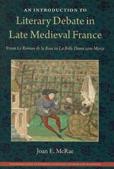
Joan McRae (French and Francophone Studies) published her fourth book, An Introduction to Literary Debate in Late Medieval France: From “Le Roman de la Rose” to “La Belle Dame sans Mercy.” It was published by University Press in Florida.
Philip E. Phillips (Honors associate dean), who has been re-elected president of the Poe Studies Association, chaired “Revisiting The Narrative of Arthur Gordon Pym” at the Modern Language Association’s annual convention. He also chaired “Poe and the Global Gothic: New Perspectives,” and he led the annual Poe Studies Association business meeting at the American Literature Association Conference in 2024. His most recent edited collection of essays, Poe Spaces, is under review by a university press. With the support of the Honors College and an MTSU Faculty Professional Development Travel Grant, he conducted research for an Oxford Bibliographies Online article on Robert Frost at Dartmouth College’s Rauner Special Collections Library this year. Phillips drew from his research and other activities in New Hampshire to offer a new graduate seminar at MTSU on “Frost and his Contemporaries” in summer 2024. Additionally, he traveled to Rome to
consult ninth- through 12th-century manuscripts at the Vatican Library in support of a collaborative book project on Boethius, Cassiodorus, and The Consolation of Philosophy that he is editing and revising.

MTSU alumna Miura Rempis-Locke (’21, History/Political Science) has returned to the Honors College, now serving as the student engagement and programming coordinator after earning a Master of Public Administration and Policy from American University. She will advise the Honors College ambassadors and Omicron Delta Kappa.

John R. Vile (Honors dean) authored two new books. The Christian Cross in American Public Life: An Encyclopedia (2024, Cambridge Scholars Publishing) is part of a series of similar writings, including Prayer in American Public Life: An Encyclopedia (2022, MTSU’s The First Amendment Press) and The Bible in American Law and Politics: A Reference Guide (2020, Rowman and Littlefield). The Encyclopedia of Presidential Vetoes from Washington Through to Biden (William S. Hein and Co.) also was published in 2024.
Cody Malone (’13, Aerospace), a former Buchanan Fellow, was promoted to major in the U.S. Air Force in April. He is currently an instructor pilot for the F-16 fighter aircraft.

Benjamin Adams (’23, Political Science and International Relations) was admitted to the University of South Carolina’s Rice School of Law.
Jeffrey Allen (’19, International Relations/Philosophy) is working in Nashville in information technology and is now married to Basak, a native of Turkey.
Tori Bascou (’24, Forensic Science/ Dance) was accepted to Texas Tech University for the Forensic Investigation master’s program following her May graduation.
An Honors Buchanan Transfer Fellow, Rachel Booher (’23, Foreign Languages) is now pursuing a master’s in English and became the University’s first Phi Kappa Phi Marcus L. Urann Fellow. She was one of only six students awarded the $20,000 scholarship in 2024 to use toward her graduate education.
Dani Bryson (’09, Political Science) had a book review published in The Gospel Coalition in December 2023 titled “How to Seek Biblical Justice in an Imperfect World,” which reviewed Reforming Criminal Justice by Matthew T. Martens.
Rebecca Clippard (’18, Foreign Languages) was awarded the exclusive MEXT Research Scholarship by the Japanese Ministry of Education, Culture, Sports, Science, and Technology to complete a postgraduate degree at a Japanese institution.
After graduating in May, Emilie Conners (’24, Marketing) secured a position working at Grammarly after serving as Pearson Campus Ambassador and social media student worker for the Jones College of Business Advising Center.
Yaseen Ginnab (’23, Biology/Psychology), a Goldwater recipient and Buchanan Fellow, will attend St. Francis Xavier University in Nova Scotia to earn a master’s degree in Evolution and Ecology. He earned a tuition waiver and a stipend. Ginnab also was an honorable mention for the 2024 National Science Foundation Graduate Research Fellowship Program.
Addison Hadley (’20, Political Science) works as a professional mental health counselor while also engaging in community service. She is also the winner of Miss United States 2023 and is currently pursuing multiple service initiatives to improve the lives of children around the country.
Andrew Heim (’18, Psychology) completed his Ph.D. in Experimental Psychology at the University of Tennessee in spring 2024.
Goldwater recipient Elizabeth Kowalczyk (’23, Forensic Science) is working at the University of North Texas Health Science Center with the Center for Human Identification while completing her Ph.D.
Kacie Leonard (’23, Animal Science) completed an internship with Timmerman Feedlot Management and is now working as a cattle foreman at the Roberts Cattle Co. Feedlot in Nebraska.
Vincent B. Lillegard (’09, Anthropology) joined the Barnes & Thornburg firm’s Corporate Department as a partner in 2023. He received his J.D. from the New York University School of Law and previously was a partner with Bass, Berry & Sims PLC.
James Morton (’18, History/Political Science) earned his law degree at Baylor University in August after originally planning to pursue a Ph.D. in Church and State.
Former Buchanan Fellow Dylan Phillips (’13, Recording Industry), aka “nobigdyl,” won a Grammy Award in 2024 for his contributions to fellow MTSU alum Lecrae Moore’s Grammywinning album.
Buchanan Fellow alumna Dara Zwemer (’22, Psychology) was awarded the 2024 National Science Foundation Graduate Research Fellowship Program at the University of Utah.
Jennifer Jean Jordan-Henley (’84, ’85), an Honors graduate who earned bachelor’s and master’s degrees in English, died Aug. 20 following a short illness. She and husband Terry met at MTSU and married in 1985. Upon graduation, the couple moved to Knoxville, where Jordan-Henley became the Writing Center director at the Oak Ridge campus of Roane State Community College. She received the Tennessee Board of Regents’ Distance Education and Innovation Award for Outstanding Service for creating and publishing methods of online tutoring in the early 90s before it became common. She later created an online writing lab, which won national awards, and she developed one of the first online courses in Tennessee.
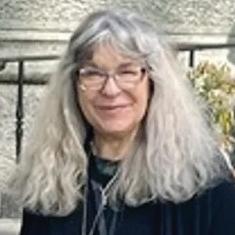
The Honors College deeply appreciates friends who have contributed to its success in countless ways. Philanthropic support has been integral to the college’s history, most notably through the construction of our beautiful building. We are honored to recognize those who made giving to the college a priority in 2023–24.
Abygail Adams, in honor of Gamma Beta Phi
Ivy Elizabeth
Justine Adams
Judy and Mohammed Albakry
Ty Amoruso
Gregory Baker for Mark Hall, Renaissance Charitable Foundation
Katherine and Bryan Podzius Bogle
Kirsten Bowland
Sylvester and Semanthie Brooks
David Butler
Christopher and Gloria Ciecka
Mark Clark
ConAgra Foods Foundation
Katherine Crytzer and Joseph Oliveri
Victoria Cummings
Nancy and Bobby Cummins
Rodd Daigle
Barbara and Louis Davis
Samantha and Dr. James Donaldson
Meredith Dye
James and Deborah Edmondson
Katie Enzor
Mary Evins
Marissa Farabee
Sydney Fischer
Yaseen Ginnab
Raiko and John Henderson
Judi Hiza
Brian and Rebekah Hoffpauir
Debra and James Hopkins
Dr. Janet Hudson
Bruce and Alice King Huskey
The Jennings and Rebecca Jones Foundation Inc.
Faye and Gary Johnson
Stephen and Beth Jones
Jennifer and Terry Jordan-Henley
Jason Kadzban
Robert Knies and Katherine Daniel
Diana Kulas, Fidelity Charitable
Reuben and Carroll Kyle
Florante Laurel
Robin and Michael Lee
George Lindemann
Rebekah and Scott Malone
Lee and Carla Martin
Paul Martin
June McCash
Joan McRae Kleinlein
Marilyn and Philip Mathis
Don and Carolyn Midgett
George and Kim Murphy
Matthew and Morgan Murphy
Don O'Guin
Philip Phillips and Sharmilla Patel
Judy Powell
Marsha Powers
Betty Price and Brooks Wilbourn
Mitch Pryor
Azim Razzaq
Dianna and Mark Rust
Kathleen Schmand
Andrew Sheets
Jarron Springer, Greater Nashville Realtors Inc.
Audrey Starr
Thrivent, on behalf of Russell Biesada
Robert and Jennifer True
Terry Turner, Pinnacle Bank
Paul Gregory
Van Patton
John and Linda Vile
Suzanne M. Wakefield
Brian and Kaitlyn Walsh
Kelsey Wells
Jake Austin West
Darcy and George White
Vincent and Stacey Windrow
James and Hanna
Romans Witherspoon
Andy and Cheryle Womack Charities
Aid Foundation
DorLinda Woodard
Jennifer Woody
Mark and Kristi Worrell
Paul Wydra

The Honors College is raising funds to support educational enhancement opportunities for our talented students, particularly scholarships, study abroad, student research and travel to conferences, and Honors publications.
Please consider making a tax-deductible gift.
• To make a gift online, go to mtsu.edu/supporthonors


• To make a gift by mail, please make your check payable to MTSU Honors College and send it to: Middle Tennessee State University Development Office 1301 E. Main St. MTSU Box 109
Murfreesboro, TN 37132
Thank you in advance for your support!
Areté Magazine
University Honors College
MTSU Box 267
1301 E. Main St. Murfreesboro, TN 37132

by J.